Remember all the weird and wonderful things you’ve Googled over time? You probably can’t, but Google can. Who wants their every random thought going on permanent record? Good news — DuckDuckGo offers you a more private option.
DuckDuckGo is a privacy-focused alternative to mainstream browsers. Unlike Google, it has a strict anti-tracking policy. It stops websites from collecting data about your browsing habits.
You might be familiar with the controversy about DuckDuckGo’s browser allowing certain Microsoft trackers during page loads. Many heard about this and wondered “is DuckDuckGo safe?”
DuckDuckGo itself was unhappy about this flaw, but at the time it was legally bound to allow tracking scripts to run. The company amended the issue, and earned back its reputation as one of the safest search engines for privacy-focused people.
So, what is DuckDuckGo? In this article, I’ll cover everything you need to know about the search engine. This includes how it works, how to use it, and why you might want to.
Want an extra layer of privacy when browsing on DuckDuckGo? Try CyberGhost VPN to hide your IP address and get military-grade encryption for all your internet traffic — even your ISP can’t see what you do online.
What Is DuckDuckGo?
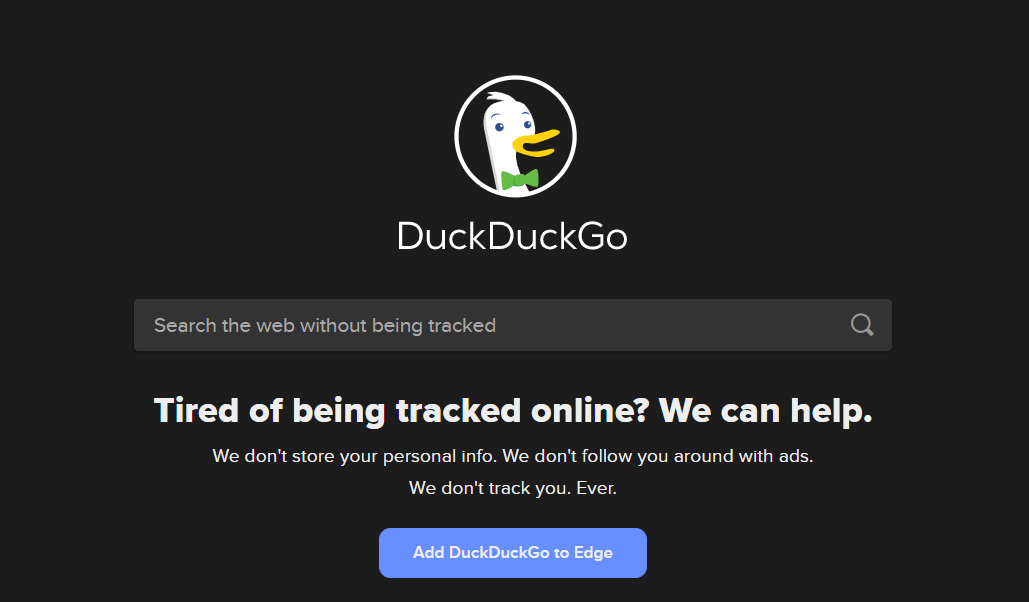
Founded in 2008, DuckDuckGo is a privacy-focused search engine with an anti-tracking policy. The engine doesn’t keep information about your searches, and it prevents websites from collecting information about you.
Since DuckDuckGo doesn’t show you search results based on previous searches, you don’t get biased search results. In contrast, Google often uses your data to offer you content you’re more likely to engage with, so you may not get variety in your search results. That makes it easy to get trapped in a cycle of confirmation bias.
One study shows Google’s results may have political bias and can influence political decision making. This isn’t good if you care about having enough knowledge to make a political decision most true to your values.
With DuckDuckGo, you’re less likely to get stuck in an echo chamber. You’ll have access to a wider range of information — diversity is the spice of life.
Privacy advocates regard DuckDuckGo as one of the safest search engines. On the other hand, worrying news about Google’s outright disregard for privacy is coming out all the time. That may be enough to make you join lots of other people in switching over to DuckDuckGo.
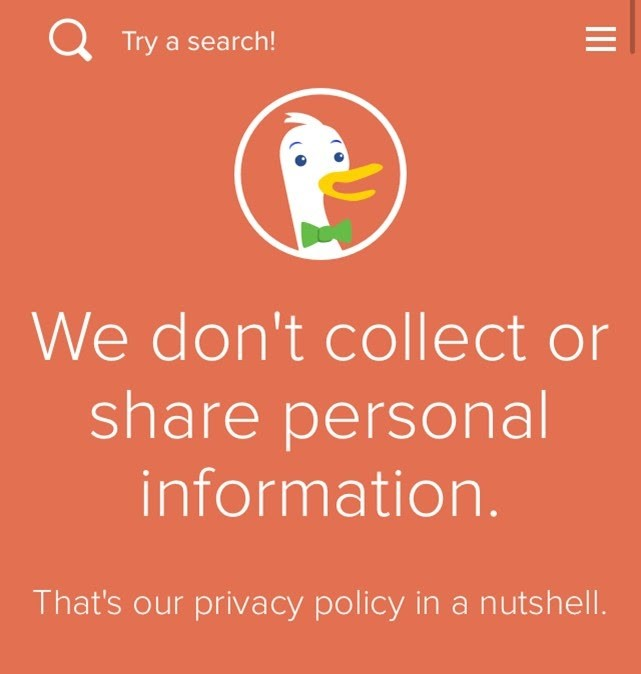
Unlike other mainstream search engines, DuckDuckGo doesn’t store your personal info, follow you around with ads, or track you online. All this should add up to a safer, less creepy browsing experience.
DuckDuckGo gives you one more layer of privacy protection, but you’ll need to take a few extra precautions to ensure you’re properly covered.
DuckDuckGo Search Safety Precautions
- Pair with a private browser.
- Check the ‘Privacy Grade’ of every website you visit.
- Use a robust antivirus program.
- Connect to a reliable VPN, like CyberGhost.
What’s an Anonymous Search Engine?
By now, Google knows things about you before you do… If that makes you squirm, it might be time to switch to an anonymous search engine.
Unlike other search engines, which collect your information when you use them, an anonymous search engine doesn’t track you or your searches, or tie them to you in any way.
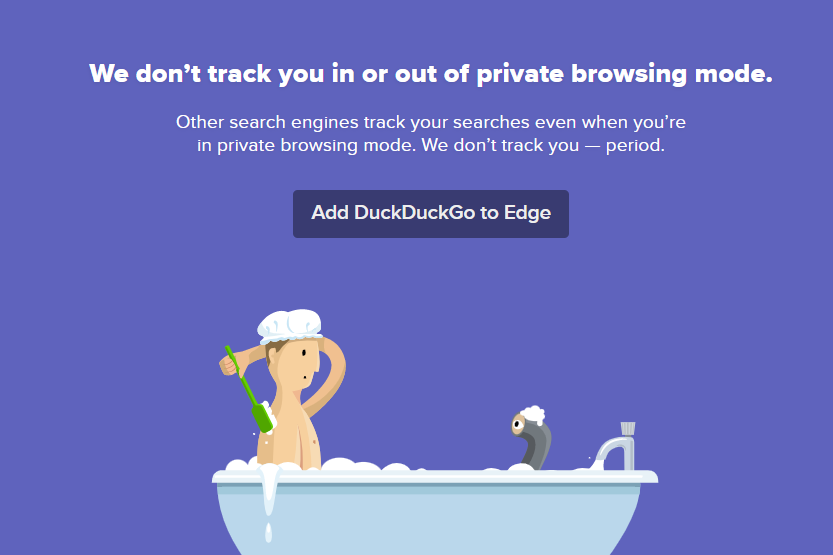
Other search engines like Google remember all your searches from time immemorial, even those you made in Incognito mode.
Here are some more myths about Incognito mode. Basically, Incognito or private mode doesn’t really work to hide your browsing history – your ISP, Google, websites, and the rest can still see what you’ve been up to. That’s why so many switch to anonymous search engines like DDG.
Google combines your search history with other personal identifiers like your age, gender, location, IP address, and device information to build a personal profile of you. It then uses this profile to serve you up personalized search results and targeted ads.
Google also plants trackers on millions of other websites that log your every move.
By comparison, each time you search with an anonymous search engine, it’s on a clean slate. The search engine doesn’t know who you are, where you’ve been, or what you’ve searched before.
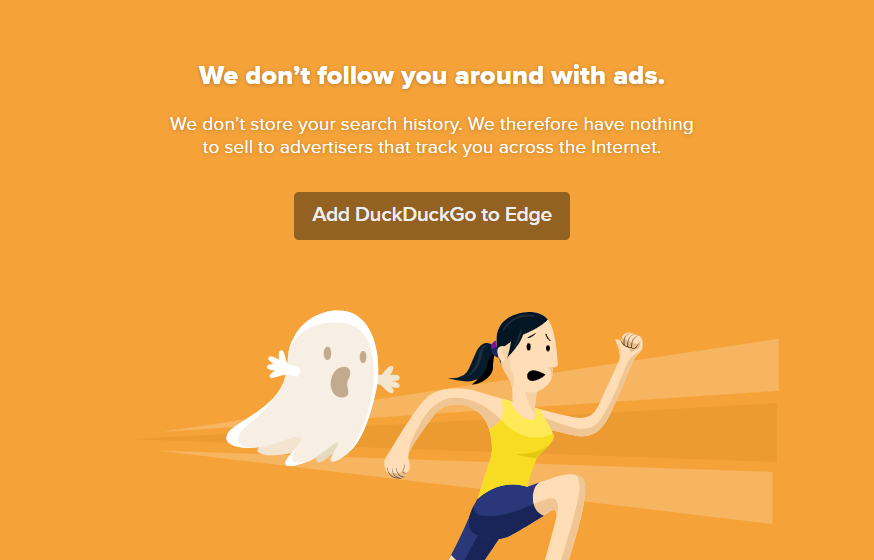
You get to browse the internet without personalized ads pestering you.
You do lose the convenience of auto-suggestion and checking back on your search history, but that’s a price you must pay for your privacy.
Anonymous search engines free you from oppressive “filter bubbles” or echo chambers. That’s where you only see what the search engine thinks you want to see. (Remember how politicians exploited filter bubbles to polarize the US electorate ahead of the 2016 elections?)
Use an anonymous search engine if you want less biased search results. DuckDuckGo is one of the most popular anonymous search engines available today. Let’s find out a little more about how it works.
What Does DuckDuckGo Do?
It’s really about what DuckDuckGo doesn’t do that makes the difference.
Private Search
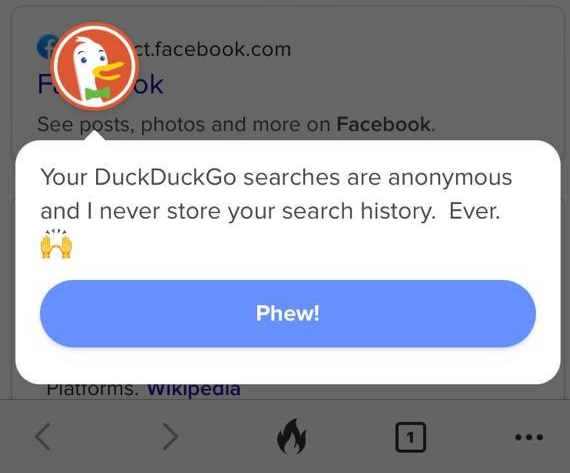
Unlike Google, Yahoo, and Bing, DuckDuckGo doesn’t collect cookies, IP addresses, or user-agent data (like your device information or the web browser you use). It also doesn’t track your searches in a way that links them back to you.
No Search Leakage
DuckDuckGo uses search leakage to describe how search engines leak or reveal your search terms to sites you choose to visit. This is a threat to your privacy. DuckDuckGo doesn’t forward your search terms or personal data to websites you visit since it doesn’t collect them in the first place.
Tracker Blocking
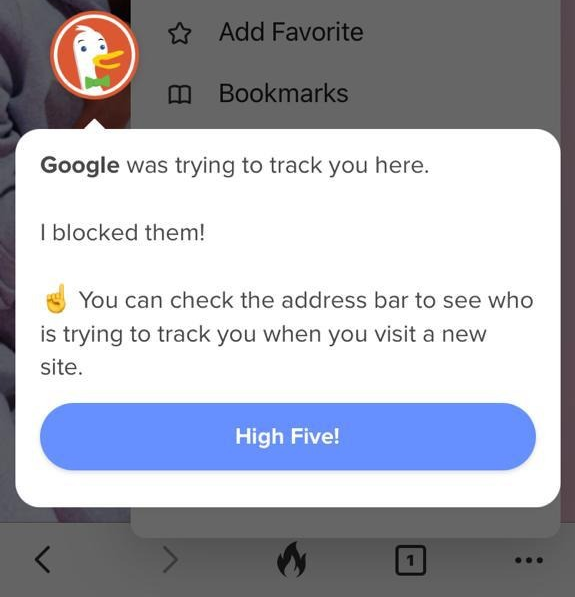
DuckDuckGo does a whole lot more than just make your searches anonymous. It also blocks third-party trackers across the web from collecting your data.
Ad Blocking

You also get an ad blocker with the Privacy Essentials browser extension and mobile app. This blocks many of the banner ads and popups you typically see in your search results.
Do Not Track
DuckDuckGo warns sites not to collect, share, or sell your data through its Global Privacy Control (GPC) feature.
GPC is a browser or device setting signaling to websites your preference for privacy. While other browsers like Chrome also include a Do Not Track (DNT) feature, it’s not mandatory and most websites simply ignore this request.
DuckDuckGo’s DNT is more than just a suggestion. GPC allows DDG to take legal action in certain jurisdictions if websites don’t respect the request.
Privacy Grade
Available in both the mobile app and the browser extension, Privacy Grade lets you know when, and to what extent, a website tries to track your data. It also tells you how DuckDuckGo has blocked these trackers to improve your privacy.
Burn Bar

DuckDuckGo’s mobile app’s Burn Bar lets you delete your browsing data and all cookies from your device when you close a session. It works similar to browsing in Incognito mode, but thanks to DuckDuckGo’s anonymous search function, you get far more anonymity. Your search history disappears entirely, not just off your device, but from the search engine and the wider web too.
Cybersecurity
DuckDuckGo blocks your browser from accessing any known malicious sites to spare you from certain cyberattacks with it’s Content Security Policy (CSP).
Privacy Controls
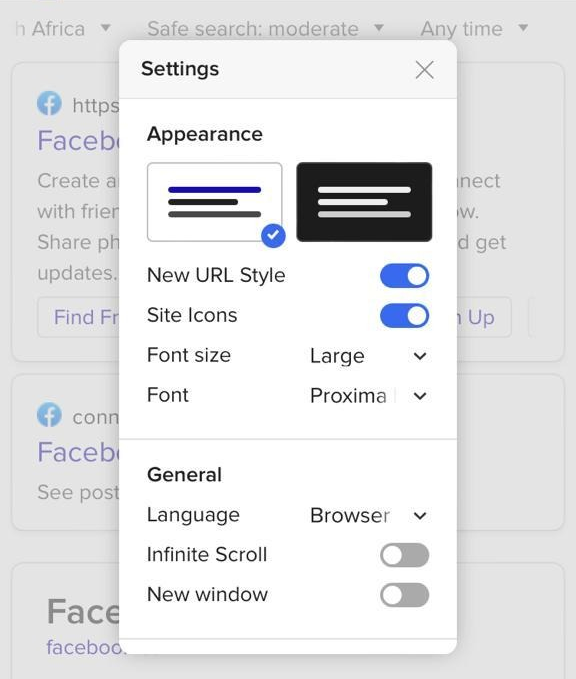
DuckDuckGo gives you full control of your privacy settings. You can turn on SafeSearch and toggle between strict and moderate, enable Global Privacy Control, and change your theme, region, and language.
Infinite Scroll
DuckDuckGo doesn’t present its search results on multiple pages. Instead, you get a single endless scroll. Who goes past the first page, anyway?
DuckDuckGo always adds more quirky features to set them apart too, like instant weather data, a rhyme generator, visible social media bios, loan calculators, great features for developers, and a lot more.
How to Use DuckDuckGo
To use DuckDuckGo, you could either:
- Open your browser preferences/settings and set DuckDuckGo as your default search engine.
- Download the browser extension (available on Chrome, Firefox, Internet Explorer, Microsoft Edge, Opera, and Safari).
- Install the iOS or Android app.
You get more privacy features with the browser extension and the mobile app, but if you just want to give it a test drive, visit duckduckgo.com and search for something. Then compare the results with those from Google.
Before you do, though, you may want the answer to the all-important question, the reason you’re here in the first place: Is DuckDuckGo really safe?
Is DuckDuckGo Safe?
DuckDuckGo is far more private than mainstream browsers. You don’t need to worry as much about data harvesting as it’s configured to stop websites from collecting your browsing data or using cookies to stalk you online. Unlike Google, the company doesn’t keep or sell any information about you, which is a massive plus.
DuckDuckGo is considered one of the safest search engines for your privacy, but it’s good to be aware of its limits. For example, DuckDuckGo’s tracker blocker only blocks well-known trackers. New trackers are developed all the time, so it’s expected that it can’t stay on top of everything.
We’ve addressed its data privacy policy, but is DuckDuckGo safe from cybercrime? That’s a different story. Using DuckDuckGo doesn’t stop your Wi-Fi owner, ISP, or network snoops from seeing what you do online. To hide your activity from them and get better protection against cybercrime, you’ll need to use a VPN to encrypt your data and mask your IP address.
Moreover, you’ll still be susceptible to viruses and scams. Cyber attacks happen on all browsers, so DuckDuckGo isn’t a replacement for your antivirus software. To give you a better idea of what DuckDuckGo can and can’t do, here’s a list of 5 things you might want to know about it.
Pro tip: To maximize your online privacy, use CyberGhost VPN to hide your IP and encrypt your data. Combine CyberGhost’s Windows Security Suite with VPN data protection and be safe both online and offline.
1. Making a Splash
DuckDuckGo doesn’t yet pose a threat to Google. That said, DuckDuckGo’s popularity is growing at an impressive rate. According to Statcounter, DuckDuckGo is the third-largest search engine with a market share of 0.75%. This doesn’t seem like a lot, but it’s not bad considering how Google dominates the competition.
2. You’ll Still See Ads
DuckDuckGo’s focus may be privacy, but it’s not a charity.
DuckDuckGo makes money through advertising and affiliate revenue.
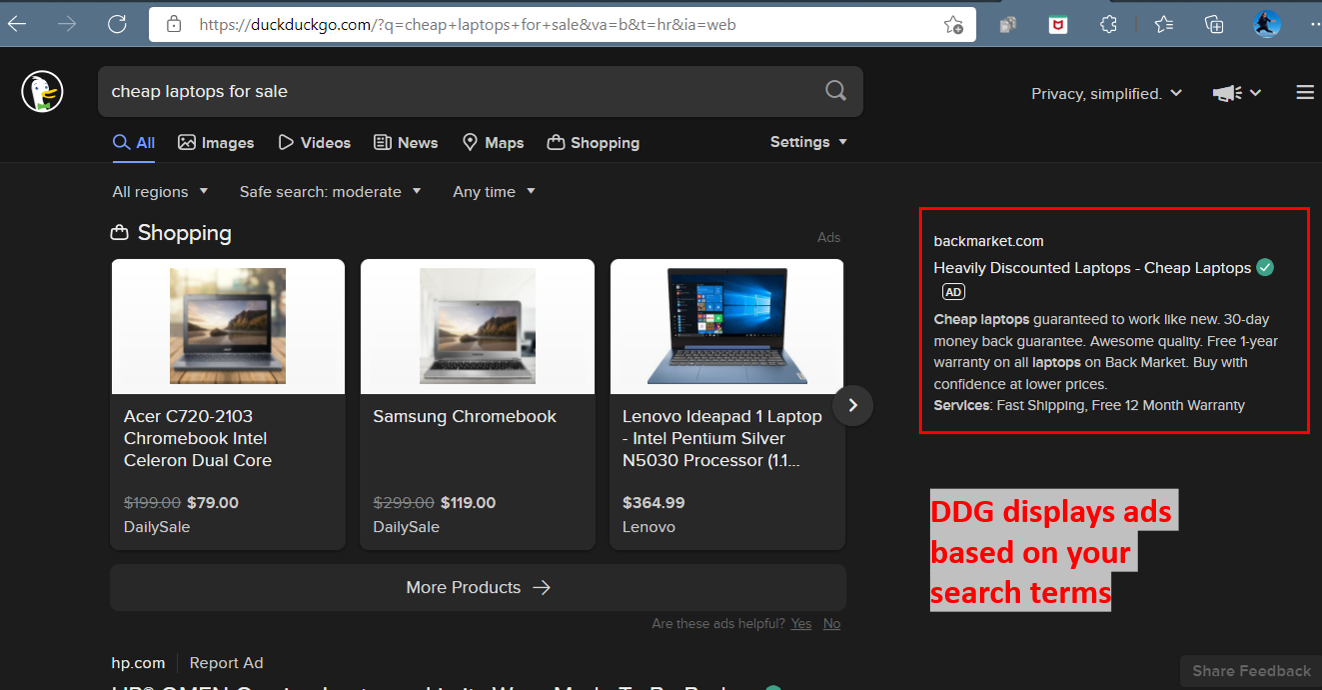
If you’ve used DuckDuckGo before, you may have noticed ads to the right of your search results. Unlike Google, those ads are not personalized (based on your search history, personal information, purchase history, etc.), because your data isn’t tracked.
Instead, DuckDuckGo’s business model relies on serving contextual ads, (based on your search results, not on your personal data). If you search for a laptop, you’ll see ads for laptops, but these ads won’t follow you around next time you use the search engine.
DuckDuckGo also earns a commission whenever you buy a product from one of its partners after being served an ad or searching for it on DuckDuckGo.

3. Big on !Bangs
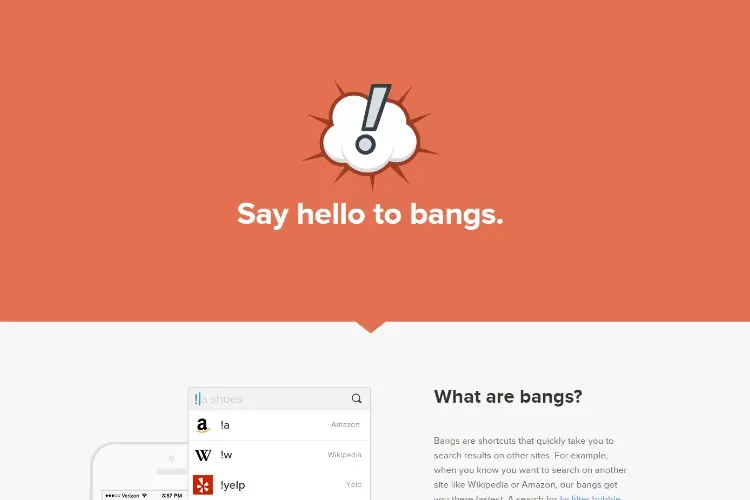
DuckDuckGo’s !bangs are shortcut commands that take you directly to search results on other sites.
Want to look up Edward Snowden on Wikipedia? Type “!w Snowden” and go straight to the relevant Wikipedia results. Shopping for a laptop on Amazon? Type “!a laptop” and get instant results on Amazon.
Problem is, because you go straight to these websites, you lose any protection you had within DuckDuckGo’s “privacy zone”.
4. Endorsed by Tor
You double your shield when you use DDG together with the Tor browser.
Tor anonymizes all your browsing traffic more thoroughly, and sends it through a series of random, encrypted servers before it gets to its destination.
This makes it nearly impossible for anyone to track your internet activity.
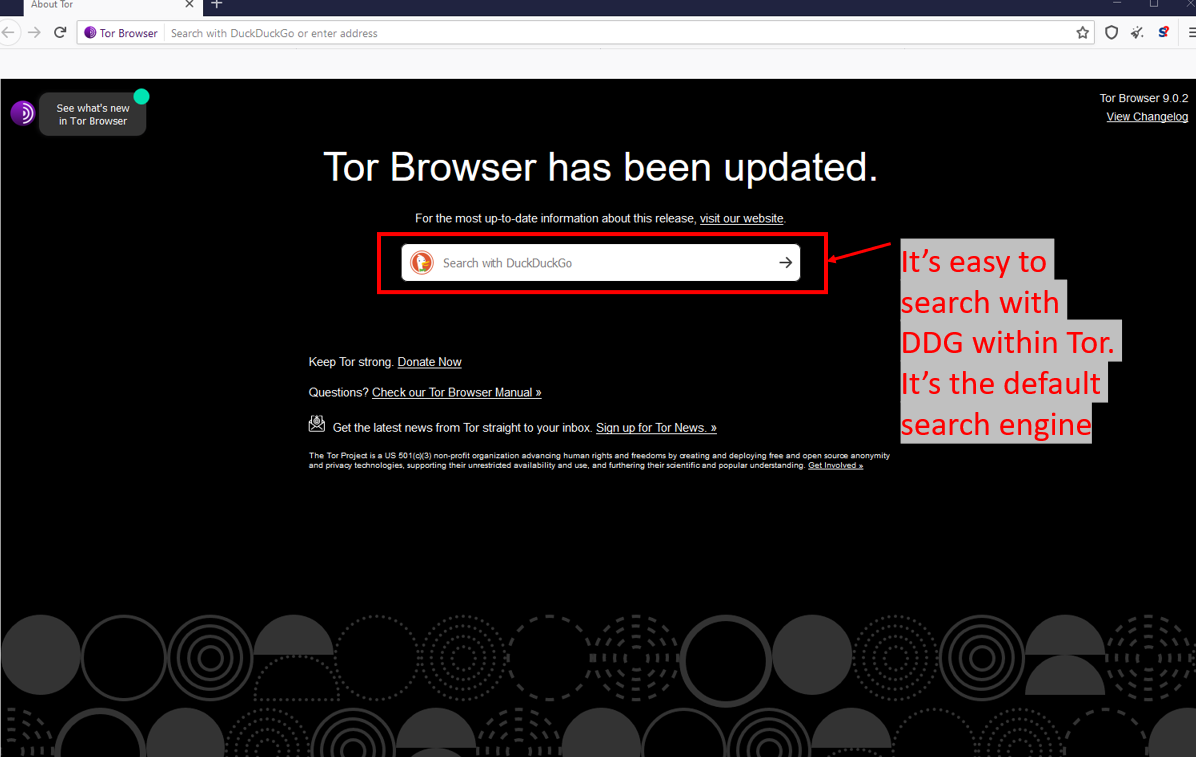
It’s easy to use the search engine with added Tor protection. Simply browse with Tor and search with DuckDuckGo.
You don’t even have to tweak any settings as DuckDuckGo is the default search engine on the Tor browser.
5. Not as Private as Promised
Despite being a privacy pioneer, DuckDuckGo raises a few privacy concerns.
-
-
-
-
- Ad-driven. DuckDuckGo is still a for-profit company. It uses an advertising and affiliate marketing business model. However, DuckDuckGo claims they can still make money without using trackers, so that’s good.
- Displays search terms in URL. Other private search engines like StartPage and Search Encrypt don’t do that. They encrypt URLs so people can’t make sense of them. If you try to go to links in your history, you’re directed back to the search engine’s homepage.
- Searches show up in Browser History. When you search on DuckDuckGo, your search terms show up in your browser history. This is only a problem if other people have access to your computer and you’re too lazy (or forgetful) to empty your history. You can also use Incognito mode to circumvent this issue.
- Privacy-bursting “!bangs”. You might easily assume the “!bangs” feature lets you search websites with DuckDuckGo’s protection, but it doesn’t. If you use “!bangs” to search Google, it’s the same as going straight to Google and searching from there.
-
-
-
These points may raise some eyebrows, but we’re not spoiled for choice when it comes to private browsers. DuckDuckGo is still a great option for privacy-conscious netizens. Compared to Google, it’s a privacy paradise — especially when you use it with CyberGhost VPN.
DuckDuckGo’s Pros and Cons
| Pros | Cons |
| ✅Prioritizes your privacy | 🗙Not as convenient as Google |
| ✅No personalized, targeted ads | 🗙No personalization (can result in less relevant results) |
| ✅No search leakage–Your personal information isn’t revealed to third parties | 🗙Fewer integrated services like Google Maps. Gmail, etc |
| ✅No filter bubble–everyone gets the same results | 🗙Based in the US–can be compelled to hand over data to law enforcement agencies. DuckDuckGo says it has nothing to handover to get around this |
| ✅Fun features like a rhyme generator, weather data, extra features for developers, visible social media bios, loan calculators, etc. | 🗙You’ll still see ads next to your searches, though these won’t be personalized |
| ✅Simple, easy-to-use interface | 🗙Privacy concerns around !bangs and the use of search terms in urls |
| ✅Growing in popularity and improving every day |
Now that we’ve looked at DuckDuckGo in some detail, let’s see how it compares to the king of search engines, Google.
DuckDuckGo or Google?
What matters more to you, privacy or convenience? DuckDuckGo doesn’t come close to Google’s power and convenience, but if privacy is your main concern, then Duck’s got your back.
| DuckDuckGo | |
| Enhanced privacy | Personalized content |
| No targeted ads | Integration across Google services (Gmail, Maps, etc) |
| No filter bubble or echo chamber effect | Records search history |
| Clean and lightweight user interface | More complete, up-to-date convenient results |
Here’s a detailed comparison of the privacy offered by the various mainstream and anonymous search engines. Spoiler: Google is by far the worst, but surprisingly DDG isn’t necessarily the best.
How to Use DuckDuckGo Safely
As we’ve seen, DuckDuckGo goes a long way to defend your right to privacy online, but it has its shortcomings. Fortunately, it’s not the only weapon in your arsenal. Ramp up your privacy and security with these 5 measures.
1. Use DuckDuckGo on a Private Browser
Popular browsers like Chrome or Edge save your search history and share it with third-parties, even when you use incognito mode. This means that even though DuckDuckGo deletes your search history, it will still be saved in your browser – that is, unless you use a private browser like Brave or DuckDuckGo’s own browser instead.
For maximum privacy, select DuckDuckGo as your default search engine.

That way, you get DuckDuckGo’s search privacy plus your entire browsing history vanishes the moment you close the browser.
2. Tor + DuckDuckGo = Total Privacy
For the privacy paranoid, Tor with DuckDuckGo is as locked up as it gets.
Tor (The Onion Router) routes your browsing data through multiple encrypted servers. This makes it impossible for anyone to track your internet use.
Simply browse with the Tor browser to use the 2 together. If you type search terms into the address bar on Tor, it’ll use DuckDuckGo to do the search by default.
3. Keep an Eye On ‘Privacy Grade’
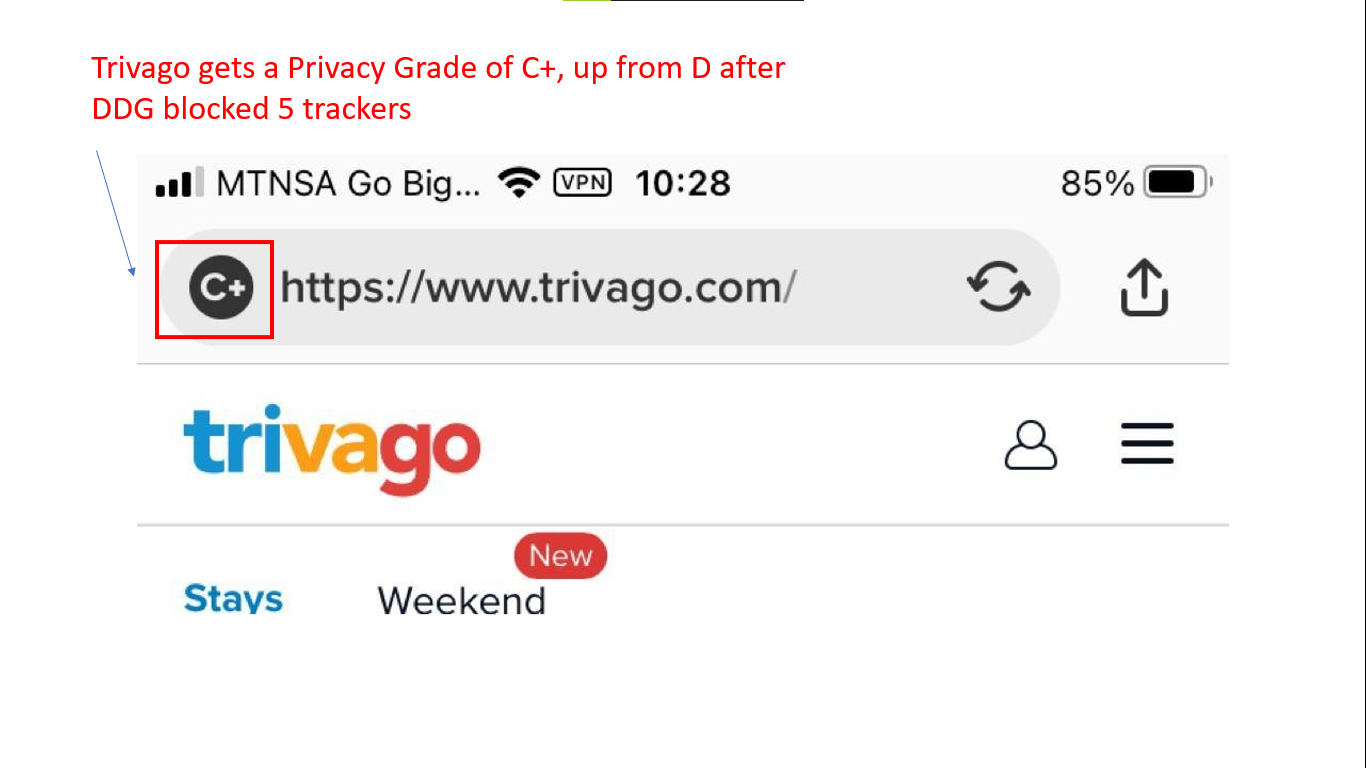
Be sure to check the Privacy Grade of any website you visit through DuckDuckGo.
Look out for a single icon/letter in the browser’s main toolbar. The icon displays a privacy rating for any site you visit from “A” to “F,” with “A” being the safest. DDG blocks all trackers to improve the grade, but it’s up to you to flee if the final grade is still a fail.
4. Update Your Antivirus Program
Even with your privacy set to the max, you’re still vulnerable to viruses and malware. Protect yourself with a decent antivirus program and always check it’s up to date.
The CyberGhost Security Suite for Windows comes with a powerful antivirus. Get the Security Suite and get full protection against some of the most advanced cyber threats, all for less than a coffee per month on top of your VPN subscription.
5. Use DuckDuckGo With a VPN
DuckDuckGo tries to protect your privacy while you search, but it offers little defense against other threats on the Internet, like government surveillance, social media trackers, and cybercriminals.
DuckDuckGo doesn’t encrypt all your traffic or hide your IP address, which means any prying eyes can still see your activity. This is especially true on public Wi-Fi, where you expose yourself to cybercriminals lurking on the network.
When you hide your IP address with a VPN, no one can link your activity to you. VPN encryption further increases your privacy and security by scrambling the contents of your traffic so no one can decipher it. Use CyberGhost VPN with DuckDuckGo for ironclad data protection.
Why Choose CyberGhost VPN
CyberGhost VPN is one of the most secure and feature-rich VPNs, and among the most affordable too. You can connect up to 7 devices at any time, so everyone in your household is covered by your subscription. Here’s a list of some of our most sought-after features.
-
-
-
-
- User-Friendly. CyberGhost VPN is easy to use and has a simple and attractive interface. You can connect to any of our 9000+ servers from any location in the world with a single click.
- Advanced Encryption. CyberGhost VPN uses military-grade encryption for your traffic. This shields your digital identity from spying and interference.
- Ad Blocking. We offer an ad-blocking feature so you can filter out most ads.
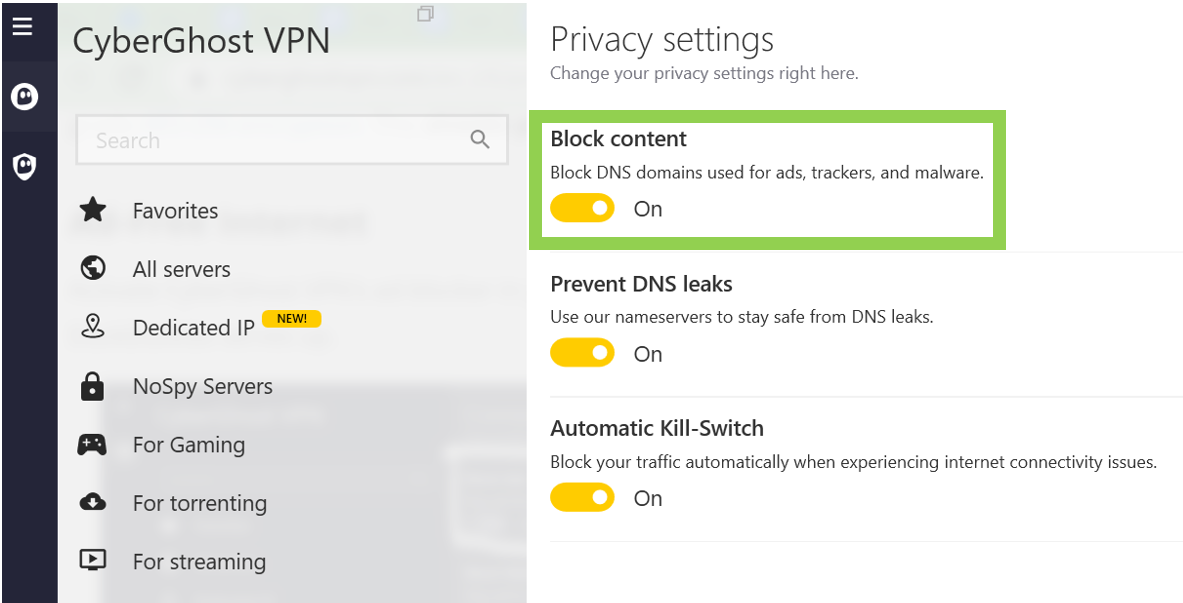
Turn CyberGhost VPN’s Block content feature on for extra ad filtering
- Zero Logs. We’re an independently audited No Logs VPN. That means we don’t store or share any of your data. Read our quarterly Transparency Report to see all the official requests for Ghostie data we receive (and don’t comply with).
- Ultra-Fast Browsing Speeds. Our super-fast network includes 10Gbps servers in all busy locations. Pages load in a flash and our streaming-optimized servers enable buffer-free video.
-
-
-
Last Words
As they say, if it looks like a duck and walks like a duck, it probably is a duck. DuckDuckGo walks the talk enough to suggest you’re safer over on the duck side.
At least you stay out of range of Google, Bing, and the rest, who don’t give a duck’s butt about your privacy.
That said, DuckDuckGo does have a way to go before it poses a real challenge to the search giants. It’s also not the final solution to your privacy concerns. You need to pair it with a private browser and encrypt your entire connection with a reliable VPN like CyberGhost to really fly below the radar.
Install CyberGhost VPN and discover the true meaning of privacy, simplified.
FAQ
DuckDuckGo is considered one of the safest search engines in terms of privacy. Next to Tor, it stands as a strong contender for safer regular browsing. It has a strong anti-tracking stance and tries to stop websites from tracking you online.
On the other hand, Google is the opposite of privacy. It’s found itself in legal trouble for not respecting user privacy.
DuckDuckGo tries to stop websites from collecting your data, but people on your network can still see what you’re up to online. To enjoy extra privacy when browsing, use CyberGhost VPN with DuckDuckGo. It stops your Wi-Fi owner, ISP, and snoopers on your network from being able to track your activity.
DuckDuckGo is often ranked as the safest search engine for everyday internet users.
The Onion Browser (Tor) takes things to the next level in terms of privacy. However, the browser can connect you to the dark web, so it’s not necessarily the safest choice. The answer depends a lot on the criteria you use, and people have differing opinions about it.
DuckDuckGo is an overall great choice if you’re looking for more privacy. Its anti-tracking policy means you’ll have more control over your data. You’ll also get less biased search results, so you’ll find more variety than a Google search provides.
Use DuckDuckGo with a secure VPN to improve your online protection.



Leave a comment
eliot howard
Posted on 01/09/2022 at 07:41
Does DDG cost?
Ghostie
Posted on 02/09/2022 at 11:17
Hi Elliot. No, DuckDuckGo is free to use, although you may pay with your personal data. This is why it’s best to pair with a VPN. That way your data is encrypted and your real IP is masked.
gewappnet
Posted on 20/02/2022 at 18:15
Regarding ads in DDG search results: Ads are completely optional in DuckDuckGo. You can just turn them off in the settings without any restrictions.